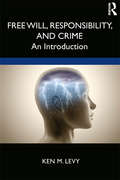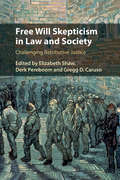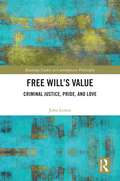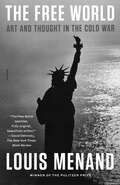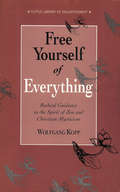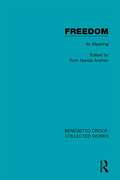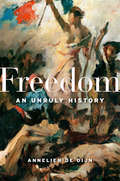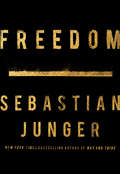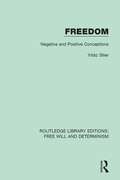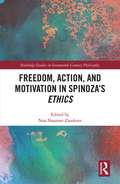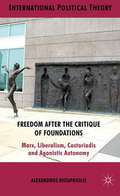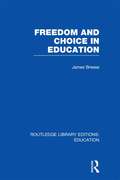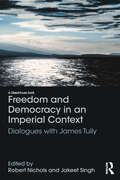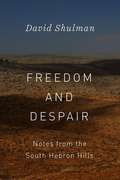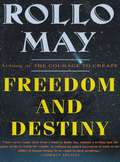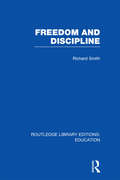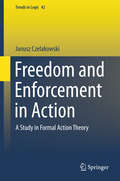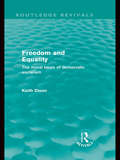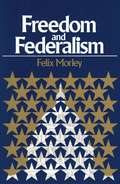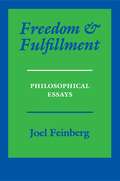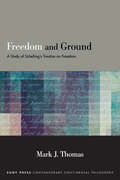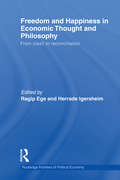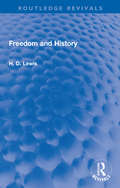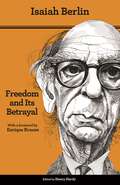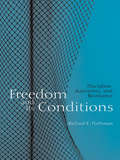- Table View
- List View
Free Will, Responsibility, and Crime: An Introduction
by Ken M. LevyIn his book, philosopher and law professor Ken Levy explains why he agrees with most people, but not with most other philosophers, about free will and responsibility. Most people believe that we have both – that is, that our choices, decisions, and actions are neither determined nor undetermined but rather fully self-determined. By contrast, most philosophers understand just how difficult it is to defend this "metaphysical libertarian" position. So they tend to opt for two other theories: "responsibility skepticism" (which denies the very possibility of free will and responsibility) and "compatibilism" (which reduces free will and responsibility to properties that are compatible with determinism). In opposition to both of these theories, Levy explains how free will and responsibility are indeed metaphysically possible. But he also cautions against the dogma that metaphysical libertarianism is actually true, a widespread belief that continues to cause serious social, political, and legal harms. Levy’s book presents a crisp, tight, historically informed discussion, with fresh clarity, insight, and originality. It will become one of the definitive resources for students, academics, and general readers in this critical intersection among metaphysics, ethics, and criminal law. Key features: Presents a unique, qualified defense of "metaphysical libertarianism," the idea that our choices, decisions, and actions can be fully self-determined. Written clearly, accessibly, and with minimal jargon – rare for a book on the very difficult issues of free will and responsibility. Seamlessly connects philosophical, legal, psychological, and political issues. Will be provocative and insightful for professional philosophers, students, and non-philosophers.
Free Will Skepticism in Law and Society: Challenging Retributive Justice
by Elizabeth Shaw Derk Pereboom Gregg D. Caruso'Free will skepticism' refers to a family of views that all take seriously the possibility that human beings lack the control in action - i.e. the free will - required for an agent to be truly deserving of blame and praise, punishment and reward. Critics fear that adopting this view would have harmful consequences for our interpersonal relationships, society, morality, meaning, and laws. Optimistic free will skeptics, on the other hand, respond by arguing that life without free will and so-called basic desert moral responsibility would not be harmful in these ways, and might even be beneficial. This collection addresses the practical implications of free will skepticism for law and society. It contains eleven original essays that provide alternatives to retributive punishment, explore what (if any) changes are needed for the criminal justice system, and ask whether we should be optimistic or pessimistic about the real-world implications of free will skepticism.
Free Will’s Value: Criminal Justice, Pride, and Love (Routledge Studies in Contemporary Philosophy)
by John LemosThis book defends an event-causal theory of libertarian free will and argues that the belief in such free will plays an important, if not essential, role in supporting certain important values. In the first part of the book, the author argues that possession of libertarian free will is necessary for deserved praise and blame and reward and punishment. He contends that his version of libertarian free will – the indeterministic weightings view – is coherent and can fit with a scientific, naturalistic understanding of human nature. However, the author also notes that we don’t have sufficient evidentiary grounds to believe that human beings have this kind of free will. Despite this, he argues there are sufficiently strong value-based/axiological reasons to believe we have such free will and to live and act as if we have it. In the second part of the book, the author makes the case that the belief in such libertarian, desert-grounding free will is very important to defending human dignity in the context of criminal justice, making sense of justified pride and its value, and adding value to our relationships. Free Will’s Value will be of interest to scholars and advanced students working in metaphysics, philosophy of mind, action theory, ethics, and the philosophy of law.
The Free World: Art and Thought in the Cold War
by Louis Menand"An engrossing and impossibly wide-ranging project . . . In The Free World, every seat is a good one." —Carlos Lozada, The Washington Post"The Free World sparkles. Fully original, beautifully written . . . One hopes Menand has a sequel in mind. The bar is set very high." —David Oshinsky, The New York Times Book ReviewNamed a most anticipated book of April by The New York Times | The Washington Post | Oprah DailyIn his follow-up to the Pulitzer Prize–winning The Metaphysical Club, Louis Menand offers a new intellectual and cultural history of the postwar yearsThe Cold War was not just a contest of power. It was also about ideas, in the broadest sense—economic and political, artistic and personal. In The Free World, the acclaimed Pulitzer Prize–winning scholar and critic Louis Menand tells the story of American culture in the pivotal years from the end of World War II to Vietnam and shows how changing economic, technological, and social forces put their mark on creations of the mind. How did elitism and an anti-totalitarian skepticism of passion and ideology give way to a new sensibility defined by freewheeling experimentation and loving the Beatles? How was the ideal of “freedom” applied to causes that ranged from anti-communism and civil rights to radical acts of self-creation via art and even crime? With the wit and insight familiar to readers of The Metaphysical Club and his New Yorker essays, Menand takes us inside Hannah Arendt’s Manhattan, the Paris of Jean-Paul Sartre and Simone de Beauvoir, Merce Cunningham and John Cage’s residencies at North Carolina’s Black Mountain College, and the Memphis studio where Sam Phillips and Elvis Presley created a new music for the American teenager. He examines the post war vogue for French existentialism, structuralism and post-structuralism, the rise of abstract expressionism and pop art, Allen Ginsberg’s friendship with Lionel Trilling, James Baldwin’s transformation into a Civil Right spokesman, Susan Sontag’s challenges to the New York Intellectuals, the defeat of obscenity laws, and the rise of the New Hollywood. Stressing the rich flow of ideas across the Atlantic, he also shows how Europeans played a vital role in promoting and influencing American art and entertainment. By the end of the Vietnam era, the American government had lost the moral prestige it enjoyed at the end of the Second World War, but America’s once-despised culture had become respected and adored. With unprecedented verve and range, this book explains how that happened.
Free Yourself of Everything
by Wolfgang Kopp Barbara Wittenberg-HaenauerIntended for those who earnestly seek spiritual guidance, this book conveys, with clear structure and precise language, the deepest wisdom of eastern and western mysticism. Drawing from his vast experience as a practicing meditation master, and using examples from great masters of Zen and Christian mysticism, Wolfgang Kopp presents the fundamental elements necessary for a successful journey to inner freedom.
Freedom: Its Meaning (Collected Works)
by Ruth Nanda AnshenOriginally published in 1942 this book brings together contribution from some of the finest thinkers and philosophers of the 20th century such as Boas, Croce, Einstein, Haldane, Mann, and Russell. The volume discusses the problem of Freedom from diverse points of view and offers a synthesis of issues and conclusions relating to freedom as a basis for action with a view to try and fill the gaps existent in the study of the nature of Man.
Freedom: An Unruly History
by Annelien De DijnThe invention of modern freedom—the equating of liberty with restraints on state power—was not the natural outcome of such secular Western trends as the growth of religious tolerance or the creation of market societies. Rather, it was propelled by an antidemocratic backlash following the Atlantic Revolutions. We tend to think of freedom as something that is best protected by carefully circumscribing the boundaries of legitimate state activity. But who came up with this understanding of freedom, and for what purposes? In a masterful and surprising reappraisal of more than two thousand years of thinking about freedom in the West, Annelien de Dijn argues that we owe our view of freedom not to the liberty lovers of the Age of Revolution but to the enemies of democracy. The conception of freedom most prevalent today—that it depends on the limitation of state power—is a deliberate and dramatic rupture with long-established ways of thinking about liberty. For centuries people in the West identified freedom not with being left alone by the state but with the ability to exercise control over the way in which they were governed. They had what might best be described as a democratic conception of liberty. Understanding the long history of freedom underscores how recently it has come to be identified with limited government. It also reveals something crucial about the genealogy of current ways of thinking about freedom. The notion that freedom is best preserved by shrinking the sphere of government was not invented by the revolutionaries of the seventeenth and eighteenth centuries who created our modern democracies—it was invented by their critics and opponents. Rather than following in the path of the American founders, today’s “big government” antagonists more closely resemble the counterrevolutionaries who tried to undo their work.
Freedom
by Sebastian JungerA profound rumination on the concept of freedom from the New York Times–bestselling author of Tribe Throughout history, humans have been driven by the quest for two cherished ideals: community and freedom. The two don’t coexist easily; we value individuality and self-reliance yet are utterly dependent on community for our most basic needs. In this intricately crafted and thought-provoking book, Sebastian Junger examines the tension that lies at the heart of what it means to be human. For much of a year, Junger and three friends—a conflict photographer and two Afghan war vets—walk the railroad lines of the east coast of the United States. It is an experiment in personal autonomy, but also in interdependence. Dodging railroad cops, sleeping under bridges, cooking over fires and drinking from creeks and rivers, the four men forge a unique reliance on one another. In Freedom, Junger weaves his account of this journey with other topics: primatology and boxing strategy, the history of labour strikes and Apache renegades, the role of women in resistance movements, and the brutal reality of life on the Pennsylvania frontier. Written in exquisite, razor-sharp prose, the result is a powerful examination of the primary desire that defines us.
Freedom: Negative and Positive Conceptions (Routledge Library Editions: Free Will and Determinism #5)
by Yıldız SilierIsaiah Berlin made a now classic distinction between negative and positive conceptions of freedom. This book, first published in 2005, introduces a fresh way of looking at these conceptions and presents a new defence of the positive conception of freedom. Revealing how the internal debate between various versions of negative freedom give rise to hybrid conceptions of freedom which in turn are superseded by various versions of the positive conception of freedom, Silier concludes that Marx’s concrete historical account of positive freedom resolves many of the key debates in this area and provides a fruitful framework to evaluate the freedoms and unfreedoms that are specific to capitalism.
Freedom, Action, and Motivation in Spinoza’s "Ethics" (Routledge Studies in Seventeenth-Century Philosophy)
by Noa Naaman-ZaudererThe present volume posits the themes of freedom, action, and motivation as the central principles that drive Spinoza’s Ethics from its first part to its last. It assembles essays by internationally leading scholars who provide different, sometimes opposing interpretations of these fundamental themes as they operate across the five parts of the Ethics and within its manifold domains. The diversity of issues, approaches, and perspectives within this volume, along with the chapters’ common focus, open up new ways of understanding not only some of the key concepts and main objectives in the Ethics but also the threads unifying the entire work. The sequence of essays in the book broadly follows the order of the Ethics, providing up-to-date perspectives of Spinoza’s views on freedom, action, and motivation in their ontological, cognitive, physical, affective, and ethical facets. This enables readers to engage with a variety of new interpretations of these key themes of the Ethics and to reconsider their consequences both for other related issues in the Ethics and for the relevance of the Ethics to contemporary trends in philosophy of action and motivation. The essays will contribute to the growing interest in Spinoza’s Ethics and spark further discussion and debate within and outside the vast body of scholarship on this important work. Freedom, Action, and Motivation in Spinoza’s Ethics will be of interest to scholars and advanced students working on Spinoza and early modern philosophy, as well as on philosophy of action and motivation.
Freedom After the Critique of Foundations: Marx, Liberalism, Castoriadis and Agonistic Autonomy (International Political Theory)
by Alexandros KioupkiolisAn exploration of the contemporary re-conception of freedom after the critique of objective truths and ideas of an unchanging human nature, in which modern self-determination was grounded. This book focuses on the radical theorist Cornelius Castoriadis and the new paradigm of 'agonistic autonomy' is contrasted with Marxian and liberal approaches.
Freedom and Choice in Education (Routledge Library Editions: Education)
by James BreeseMuch of the material included here owes it inspiration to discussions held with groups of student teachers in the early 1970s. The book is written for such students and discusses issues such as the acquisition of knowledge, the value of examinations, dependency and religion in education. The book is intended as a thought provoker – to stimulate further discussion.
Freedom and Democracy in an Imperial Context: Dialogues with James Tully
by Robert Nichols Jakeet SinghFreedom and Democracy in an Imperial Context: Dialogues with James Tully gathers leading thinkers from across the humanities and social sciences in a celebration of, and critical engagement with, the recent work of Canadian political philosopher James Tully. Over the past thirty years, James Tully has made key contributions to some of the most pressing questions of our time, including: interventions in the history of moral and political thought, contemporary political philosophy, democracy, citizenship, imperialism, recognition and cultural diversity. In 2008, he published Public Philosophy in a New Key, a two-volume work that promises to be one of the most influential and important statements of legal and political thought in recent history. This work, along with numerous other books and articles, is foundational to a distinctive school of political thought, influencing thinkers in fields as diverse as Anthropology, History, Indigenous Studies, Law, Philosophy and Political Science. Critically engaging with James Tully’s thought, the essays in this volume take up what is his central, and ever more pressing, question: how to enact democratic practices of freedom within and against historically sedimented and actually existing relationships of imperialism?
Freedom and Despair: Notes from the South Hebron Hills
by David ShulmanLately, it seems as if we wake up to a new atrocity each day. Every morning is now a ritual of scrolling through our Twitter feeds or scanning our newspapers for the latest updates on fresh horrors around the globe. Despite the countless protests we attend, the phone calls we make, or the streets we march, it sometimes feels like no matter how hard we fight, the relentless crush of injustice will never abate. David Shulman knows intimately what it takes to live your beliefs, to return, day after day, to the struggle, despite knowing you are often more likely to lose than win. Interweaving powerful stories and deep meditations, Freedom and Despair offers vivid firsthand reports from the occupied West Bank in Palestine as seen through the eyes of an experienced Israeli peace activist who has seen the Israeli occupation close up as it impacts on the lives of all Palestinian civilians. Alongside a handful of beautifully written and often shocking tales from the field, Shulman meditates deeply on how to understand the evils around him, what it means to persevere as an activist decade after decade, and what it truly means to be free. The violent realities of the occupation are on full display. We get to know and understand the Palestinian shepherds and farmers and Israeli volunteers who face this situation head-on with nonviolent resistance. Shulman does not hold back on acknowledging the daily struggles that often leave him and his fellow activists full of despair. Inspired by these committed individuals who are not prepared to be silent or passive, Shulman suggests a model for ordinary people everywhere. Anyone prepared to take a risk and fight their oppressive political systems, he argues, can make a difference—if they strive to act with compassion and to keep hope alive. This is the moving story of a man who continues to fight for good in the midst of despair. An indispensable book in our era of reactionary politics and refugee crises, political violence and ecological devastation, Freedom and Despair is a gripping memoir of struggle, activism, and hope for peace.
Freedom and Destiny
by Rollo May"May is an existential analyst who deservedly enjoys a reputation among both general and critical readers as an accessible and insightful social and psychological theorist. ... Freedom's characteristics, fruits, and problems; destiny's reality; death; and therapy's place in the confrontation between freedom and destiny are examined. ... Poets, social critics, artists, and other thinkers are invoked appropriately to support May's theory of freedom and destiny's interdependence."-Library Journal. "Especially instructive, even stunning, is Dr. May's willingness to respect mystery. ... There is, too, at work throughout the book a disciplined yet relaxed clinical mind, inclined to celebrate ... what Flannery O'Connor called 'mystery and manners,' and to do so in a tactful, meditative manner. "-Robert Coles, America.
Freedom and Discipline (Routledge Library Editions: Education)
by Richard SmithQuestions of discipline and order arise wherever formal education is practised, and are particularly acute for those training to teach or in their first school posts. For many years now writing on these topics has tended to depict teaching as the deployment of ‘skills’ and ‘techniques’ and competent teachers as those who successfully ‘manage’ their classes. This approach is criticised by Richard Smith as manipulative and destructive of the kind of pupil-teacher relationship conducive to any but the most trivial sorts of learning. Thus the philosophical issues which the book explores are shown throughout to have their roots in problems associated with established thinking and practice, and the author’s ideas have considerable practical relevance. He argues for a thorough reappraisal of the nature and basis of the teacher’s authority and demonstrates the importance of a proper understanding of the function of punishment. He suggests that many of the problems of discipline that teachers meet may actually stem from inappropriate ways of treating pupils, and shows that solutions to these problems must be compatible with the degree of initiative and personal responsibility that it is the business of education to foster. Schools have changed in many ways, largely for the better, since the first edition of this book appeared: the young people in them are generally treated with far more respect than was the case a quarter of a century ago. The voices of a more repressive tradition however still make themselves heard from time to time. It is therefore important continually to re-state the principles on which civilised relationships between pupils and teachers need to be based.
Freedom and Enforcement in Action
by Janusz CzelakowskiAction theory is the object of growing attention in a variety of scientific disciplines and this is the first volume to offer a synthetic view of the range of approaches possible in the topic. The volume focuses on the nexus of formal action theory with a startlingly diverse set of subjects, which range from logic, linguistics, artificial intelligence and automata theory to jurisprudence, deontology and economics. It covers semantic, mathematical and logical aspects of action, showing how the problem of action breaks the boundaries of traditional branches of logic located in syntactics and semantics and now lies on lies on the borderline between logical pragmatics and praxeology. The chapters here focus on specialized tasks in formal action theory, beginning with a thorough description and formalization of the language of action and moving through material on the differing models of action theory to focus on probabilistic models, the relations of formal action theory to deontic logic and its key applications in algorithmic and programming theory. The coverage thus fills a notable lacuna in the literary corpus and offers solid formal underpinning in cognitive science by approaching the problem of cognition as a composite action of mind.
Freedom and Equality: The Moral Basis of Democratic Socialism (Routledge Revivals)
by Keith DixonUnashamedly polemical, this reissue of Freedom & Equality, first published in 1986, presents a strong and persuasively argued case for democratic socialism. In contrast to many recent books justifying conservatism and varieties of Marxism, Keith Dixon defends the two great principles underpinning democratic socialism – freedom and equality. He aims both to restore the idea of freedom to its proper place in the political vocabulary of the left and to defend a stark version of freedom as absence of constraint. Only this version of freedom, he argues, is consistent with the proper defence of civil liberties. Dixon also defends radical egalitarianism from its critics, who either repudiate its full force or reject it out of hand. He believes that freedom and equality are potentially realizable socialist goals, that democratic socialism is not necessarily linked with fraternalism, and – above all – that it should be based upon a firm and consistent conception of individuality.
Freedom and Federalism
by Felix MorleyNo less relevant today, the book provides a perceptive diagnosis of the collapse of States' rights in modern America; and it seeks the restoration of a constitutional balance between central and state authorities.
Freedom and Fulfillment: Philosophical Essays
by Joel FeinbergDealing with a diverse set of problems in practical and theoretical ethics, these fourteen essays, three of them previously unpublished, reconfirm Joel Feinberg's leading position in the field of legal philosophy. With a clarity and humor that will be familiar to readers of his other works, Feinberg writes on topics including "wrongful life" suits in the law of torts, or whether there is any sense in the remark that a person is so badly off that he would be better off not existing at all; the morality of abortion; educational options; free expression; civil disobedience; and the duty of easy rescue in criminal law. He continues with a three-part defense of moral rights in the abstract, a discussion of voluntary euthanasia, and an inquiry into arguments of various kinds for not granting legal rights in enforcement of a person's acknowledged moral rights. This collection concludes with two essays dealing with concepts used in appraising the whole of a person's life: absurdity and self-fulfillment, and their interplay.
Freedom and Ground: A Study of Schelling's Treatise on Freedom (SUNY series in Contemporary Continental Philosophy)
by Mark J. ThomasThis book is a new interpretation of Schelling's path-breaking 1809 treatise on freedom, the last major work published during his lifetime. The treatise is at the heart of the current Schelling renaissance—indeed, Heidegger calls it "one of the most profound works of German, thus of Western, philosophy." It is also one of the most demanding and complex texts in German Idealism. By tracing the problem of ground through Schelling's treatise, Mark J. Thomas provides a unified reading of the text, while unlocking the meaning of its most challenging passages through clear, detailed analysis. He shows how Schelling's implicit distinction between senses of ground is the key to his project of constructing a system that can satisfy reason while accommodating objects that seem to defy rational explanation—including evil, the origins of nature, and absolute freedom. This allows Schelling to unite reason and mystery, providing a rich model for philosophizing about freedom and evil today.
Freedom and Happiness in Economic Thought and Philosophy: From Clash to Reconciliation (Routledge Frontiers Of Political Economy Ser. #147)
by Ragip Ege Herrade IgersheimStarting from a distinction made by the American philosopher, John Rawls, in 2000 between two kinds of liberalism, "liberalism of freedom" and "liberalism of happiness", this book presents a range of articles by economists and philosophers debating the most fundamental aspects of the subject. These include the exact significance of Rawls’ distinction and how it can be related to European political philosophy on the one hand and to utilitarianism on the other hand; the various definitions of happiness and freedom and their implications and the informational basis of individual preferences. The objectives of the book are twofold: first, it is devoted to a thorough analysis of the founding texts of both liberalisms. It aims to determine the logic of selection of the concepts which these traditions consider as relevant. The Kantian pair "Reasonable"/"Rational" can be seen as the basis on which these concepts are defined, our final concern being to reveal the profound relations of complementarity between them: we call it reconciliation. Secondly, we consider a fundamental issue of welfare economics – how to appraise individual preferences – in light of the Rawlsian distinction. It is emphasized that neither a criterion based on liberalism of freedom by itself, nor an evaluation in terms of liberalism of happiness by itself exhausts the question of utility. One must combine both aspects in order to cope with that issue. To do so, it is claimed that one can resort to the concept of metaranking of preferences. All the contributions included in this book are the outcomes of a collective research project of three years. The contributors come from a variety of backgrounds and yet are unified in developing a specific position about freedom and happiness. This book should be of interest to those focusing on the history of economic thought as well as moral, political and economic philosophy.
Freedom and History (Routledge Revivals)
by H. D. LewisFirst published in 1962, Freedom and History expresses a deep concern about freedom and the way it is imperilled by misunderstandings. The cause of freedom has not always been well served by its friends; by presenting one -sided ideas of freedom they have often paved the way for extreme forms of collectivism and despotism. Professor Lewis examines works of T.H. Green and compares Green with Locke and Rousseau, to show how much the attitude of Green and other idealists to questions of education, the family, punishment, slavery, and war was affected by the individualism that underlay their thought and the failure to pay due heed to the facts of moral perplexity. This in turn is seen to owe much to the optimism of late nineteenth century thinkers and the belief in inevitable progress. The volume also discusses the nature of history, objectivity in history, religion and history, and law and morality. Author subjects the works of writers like Reinhold Niebuhr, Barbara Wootton, Ian Ramsey, Leonard Hodgson to close critical examination and presents his own ideas about the relation of theology to historical fact. This book will be an essential read for scholars and researchers of political philosophy, religion, theology, ethics, moral philosophy, and philosophy in general.
Freedom and Its Betrayal: Six Enemies of Human Liberty - Updated Edition
by Isaiah BerlinThese celebrated lectures constitute one of Isaiah Berlin's most concise, accessible, and convincing presentations of his views on human freedom—views that later found expression in such famous works as "Two Concepts of Liberty" and were at the heart of his lifelong work on the Enlightenment and its critics. When they were broadcast on BBC radio in 1952, the lectures created a sensation and confirmed Berlin’s reputation as an intellectual who could speak to the public in an appealing and compelling way. A recording of only one of the lectures has survived, but Henry Hardy has recreated them all here from BBC transcripts and Berlin’s annotated drafts. Hardy has also added, as an appendix to this new edition, a revealing text of "Two Concepts" based on Berlin’s earliest surviving drafts, which throws light on some of the issues raised by the essay. And, in a new foreword, historian Enrique Krauze traces the origin of Berlin’s idea of negative freedom to his rejection of the notion that the creation of the State of Israel left Jews with only two choices: to emigrate to Israel or to renounce Jewish identity.
Freedom and Its Conditions: Discipline, Autonomy, and Resistance
by Richard FlathmanFirst published in 2003. Routledge is an imprint of Taylor & Francis, an informa company.
